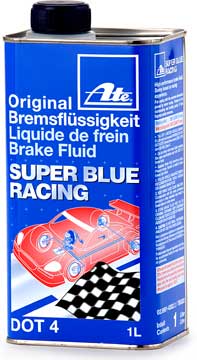While this seems contrary to conventional theory I've found that the ATE Super Blue lasts so long and performs so well in my LRs because it tolerates heat and contamination better than conventional brake fluids like the Castrol GTLMA that we always used at the shop.
Rallye/Race applications and overlanding is very much an apples to oranges comparison, but...
I think people really underestimate the long term abuse that our brake fluid is subjected to, particularly in the Southwest and Baja.
For one thing, it's hot as MMMM underhood in a V8 rover.
And it's not the kind of impulse heat of late-braking and high horsepower. It's all day long roasty-toasty with little to no cooling. The thing about rallye applications and the like is that we really only consider the heat that's generated by the pads and the possibility of boiling the fluid. That friction is very hot, but there's a lot going on to keep the braking system cool, like speed, airflow and ducting.
We don't have any of that good stuff helping us out in the Rovers. What we do have is a fairly high and constant temperature spiked by frequent higher heat. We also have a MMMMload of weight and relatively small pad surface. It takes its toll.
When we look at BP, it's important not to regard it only as a limit, but also as a capacity for heat and water absorption. Over time the BP of brake fluid actually lowers with use. Contamination is one issue and water absorption is another. ATE Super Blue can actually take on a MMMMload of water and still maintain a pretty good BP. That's kickass. Wet BP is at 3% water. I bet a lot of our trucks get to a point where they've sucked in a lot more than 3%. Even just through the MMMMty cap on most Rover master cylinders. Also keep in mind that temperature swing leads to moisture in the fluid. I know for a lot of us our trucks will run very hot underhood all day on the trail but then spend the night in the twenties or teens or even colder. This happens a lot on trails like Dusy Ershim and it adds moisture to the fluid. The truck is barely doing 10mph all day long it's hot as hell in the engine bay, but by morning it's frosted over and icy.
All of these things make life hard for brake fluid in our trucks. ATE Super Blue just stands up better. I'd say in a Rover it will go 3 years with no problems.
It's not an excuse not to maintain your fluid or change it out regularly, but particularly after long hard use on a challenging trip it's nice that the fluid can tolerate contamination and heat so well.
Over time your brake fluid is getting hotter and wetter than you think it is.
I also like the blue color whether it's road legal in your state or not. It makes it easier to do that quick visual check of the reservoir and it's easier to see when bleeding the brakes through clear tube. Some people even alternate between the amber ATE and the blue when they flush so they know exactly when the old stuff is getting pushed out.
So this brake fluid costs 15 bucks.
That matters?

